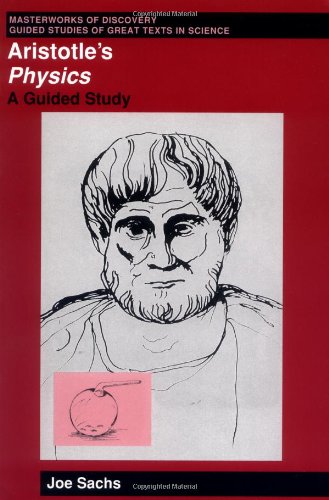Movement According to Aristotle
241b 34 Every moving thing must be moved by something. For if it does not have the source of its motion in itself, it is clear that it is moved by something else (for another 40 thing will be the mover); but if it is in itself, let AB be taken, which is moving in its own right, and not by means of some part of it being moved. First, then, to suppose that AB is moved by itself since the whole is moved and by nothing outside it,would be as if, when KL was moving LM and was itself moving, one were to say that KM was not moved by anything, 242a, 35 on account Of its not being evident what was the mover and what the moved. Then too, what is not moved by anything need not stop moving because something else is at rest, but if something is at rest because something else has stopped moving, it must be moved by something. If this is taken as given, then every moving thing will be moved by something. 40 For since AB has been assumed to be moving, it must be divisible. since every moving thing is divisible. Then let it have been divided at C.Then if CB is not moving, AB will not be moving, for if it were moving, it is clear that AC would be moving while CB was at rest. But we have agreed that what is at rest when something is not moving is moved by something, so that necessarily every moving thing is moved by something, since the moving thing will always be divisible, and when the part is not moving the whole too must be at rest.
50 And since every y moving thing must be moved by something, if something is moved with a motion in place by another moving thing, and the thing moving it is moved in turn by another moving thing, and that one by another, and so on always, it is necessary that there be become infinite. So let A be moved by B, B by C, C by D, and always he next by a next. Then since it is set down that the mover causes motion by moving, the motions of the mover 60 and the moved must happen at the same time (since at the same time the mover moves and the moved is moved); it is clear then that at the same time there will be motion of A and of B and of C and of each of the things causing g motion and being moved. Then let the motion of each be taken, and let that of A be E that of B be F, and those of C and D be G and H. For though each is always moved by another, still there will be a motion of each to be taken that is one in number; for every motion is from something to something, and not infinite at its extremities. And by a motion one in number, I mean one that takes place from something that is numerically the same, to something numerically the same, in a time that is numerically the same. For It is possible for a motion to be the same in genus, in 242b, 35 species, or in number: in genus, those in the same category of being, such as changes of thinghood or of quality; in species, those from something the same in kind to something the same in kind, such as from white to black or from good to bad of a nondiffering kind; but in number, that 40 from something one in number to something one in number, in the same time, such as from this white to this black, or from this place to that one, in this time, since if it were in a different time, it would no longer be a motion one in number, but one in species. But these things were spoken about in what went before [V, 4].
Notes:
Chains of events put into a basic logic. There are the beginnings of understanding here, but he doesn't know how to break it down properly.
Folksonomies: physics philosophy natural philosophy
Taxonomies:
/automotive and vehicles/vehicle rental (0.741452)
/business and industrial (0.362652)
/law, govt and politics (0.316757)
Keywords:
thing (0.952379 (negative:-0.394229)), motion (0.818658 (negative:-0.310695)), mover (0.625281 (negative:-0.354757)), rest (0.612994 (negative:-0.067832)), time (0.595603 (negative:-0.334369)), number (0.595176 (neutral:0.000000)), AB (0.576317 (negative:-0.263431)), moved (0.537852 (neutral:0.000000)), Aristotle Chains (0.532630 (positive:0.445807)), basic logic (0.532571 (positive:0.445807)), mover moves (0.504286 (neutral:0.000000)), nondiffering kind (0.477723 (neutral:0.000000)), different time (0.461843 (neutral:0.000000)), place (0.434947 (neutral:0.000000)), species (0.430342 (neutral:0.000000)), CB (0.399233 (negative:-0.112511)), things (0.393400 (negative:-0.313981)), genus (0.390740 (neutral:0.000000)), beginnings (0.360647 (positive:0.385949)), Movement (0.356459 (positive:0.445807)), events (0.356412 (positive:0.445807)), KL (0.355440 (neutral:0.000000)), LM (0.354773 (neutral:0.000000)), source (0.352317 (negative:-0.306056)), right (0.351981 (positive:0.348866)), KM (0.351292 (neutral:0.000000)), divisible. (0.351253 (neutral:0.000000)), account (0.351190 (neutral:0.000000)), extremities (0.350079 (negative:-0.469162)), means (0.349971 (neutral:0.000000))
Entities:
AB:Company (0.803707 (negative:-0.264137)), CB:Company (0.387837 (negative:-0.056256))
Concepts:
Thing (0.918972): dbpedia
Physics (0.588412): dbpedia | freebase | opencyc
Ontology (0.568162): dbpedia | freebase | opencyc
Fraction (0.566568): dbpedia | freebase | yago





